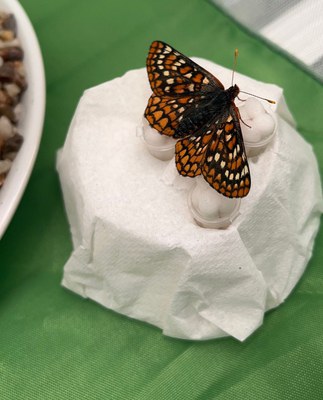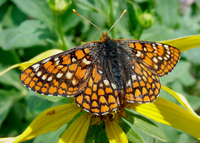ABQ BioPark Partnering With U.S. Fish and Wildlife Service to Save Imperiled New Mexico Butterfly
August 9, 2022 - The ABQ BioPark is collaborating with the U.S. Fish and Wildlife Service (USFWS) to help conserve an imperiled butterfly species found only in New Mexico’s Sacramento Mountains.
The BioPark is now home to larval Sacramento Mountains checkerspot butterflies, a subspecies of the Anicia checkerspot butterfly whose population has been declining since the U.S. Forest Service (USFS) began formal surveys in 1999. The BioPark hopes that these butterflies can help start a breeding colony that will add to the genetic diversity of this butterfly, which is struggling in the wild.
“For the BioPark to have this opportunity will strengthen our role in local conservation efforts,” said Matthew Peterson, ABQ BioPark garden manager. “If it all goes well, I think the BioPark is positioned to help bring this butterfly back from the brink of extinction.”
Today, this subspecies is virtually undetected in its natural habitat, making it one of the most endangered butterflies in the United States. The USFWS has proposed the butterfly as endangered.
The subspecies is facing a population crisis mostly because of habitat loss and degradation. In order to restore the butterfly’s wild population, conservationists must first improve habitat quality and the abundance of native plant species like the New Mexico beardtongue. Sacramento Mountain checkerspot butterfly larvae depend almost entirely on this purplish-blue flowering plant, but it’s vanishing from the landscape as a result of increasing aridity and grazing by feral horses. Adult butterflies also depend on a number of other meadow flowers as nectar sources. The USFWS, USFS, Institute for Applied Ecology, and New Mexico BioPark Society are working collaboratively on habitat restoration measures to improve conditions and habitat suitability to ensure the butterfly's survival in the wild.

In the meantime, the USFWS is looking to safeguard the subspecies from extinction by establishing captive populations at collaborating organizations. That’s where the BioPark comes in. USFWS approached the BioPark earlier this year to investigate the potential for a rearing and holding facility.
The BioPark’s rearing program will help build the checkerspot population while maintaining genetic diversity. Once restoration work has increased viable native habitat for the species, the goal is to release captive butterflies into the wild.
Anna Walker, species survival officer for invertebrate pollinators at the New Mexico BioPark Society, and Jason Schaller, ABQ BioPark curator of entomology, went on a collection trip in early July and brought back two female butterflies and two males. Within a few weeks, the butterflies had already produced hundreds of eggs, which resulted in about 150 caterpillars. These larvae will spend the next few months eating before spending the winter in an inactive state called diapause. In the spring, they will wake up and continue feeding. If all goes to plan and the caterpillars remain healthy, the BioPark will have adult butterflies by June or July 2023.
To support these caterpillars, Clay Meredith, species survival officer for plants at the New Mexico BioPark Society, collected live plants from portions of its distribution where no butterflies are present. The Institute for Applied Ecology and the USFS supported the work. The BioPark will use the plants as food for the caterpillars in the coming months, and will propagate them to provide a long-term supply of sustainably sourced forage for larvae in the coming years. The BioPark's horticulture team hopes to expand this propagation effort to supply seeds and plant starts for restoration projects in the near future.
Peterson said he is very optimistic about the project, which aligns with the BioPark’s conservation mission. Some other recent conservation projects that the BioPark has collaborated on include plant restoration at Ghost Ranch and a partnership with the Ute Mountain Tribal Park to help with the conservation of threatened plant species, the sleeping Ute milkvetch.
Thank you, Jackalope!
Thanks to a partnership between the New Mexico BioPark Society and local home and garden store Jackalope, the species survival team along with Botanic Garden staff have been able to focus their attention on the plight of the Sacramento Mountains checkerspot butterfly. By end of September 2022, Jackalope’s two-year Bees and Butterflies Campaign will have donated $50,000 to various Botanic Garden projects.

